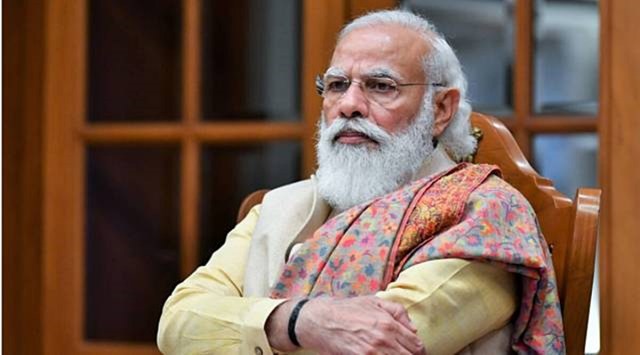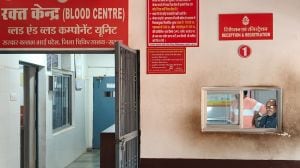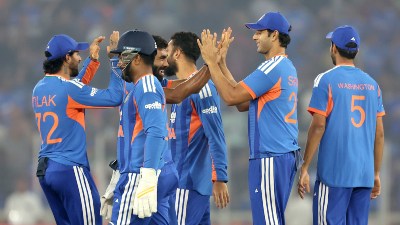Stay updated with the latest - Click here to follow us on Instagram
Gujarat HC sets aside CIC order on PM degree, fines Kejriwal
Justice Biren Vaishnav also imposed a cost of Rs 25,000 on Delhi Chief Minister Arvind Kejriwal, who had requested the information under the RTI Act.
 Prime Minister Narendra Modi (File)
Prime Minister Narendra Modi (File) Underlining that “educational documents including degrees fall within the ambit of personal information of a citizen, disclosure of which is exempted under Section 8(1)(j) of the RTI Act”, the Gujarat High Court Friday set aside a 2016 order of the Central Information Commission (CIC) asking the Gujarat University to provide information on Prime Minister Narendra Modi’s degree to Delhi Chief Minister Arvind Kejriwal.
Justice Biren Vaishnav also imposed a cost of Rs 25,000 on Kejriwal, who had sought the information under the RTI Act, and directed him to deposit the amount with the Gujarat State Legal Services Authority within four weeks.
Soon after the order, Kejriwal, in a Twitter post in Hindi, said: “Doesn’t the country even have the right to know how much the PM has studied? … Illiterate or less educated PM is very dangerous for the country.”
The BJP hit back. In a statement, party spokesperson Sambit Patra said, “What Kejriwal is doing reflects his frustration. He is naturally frustrated as his government ministers are in jail on charges of corruption and being involved in a liquor scam. His comments are a consequence of this.”
The single-judge bench, in its order, said that the CIC “transgressed its jurisdiction” and “embarked into an arena of political thicket and ventured into judicial activism on being overwhelmed by the fact that the information is sought by a citizen occupying the post of Chief Minister and thus is liable to be disclosed”.
Solicitor General Tushar Mehta, a Senior Advocate who appeared on behalf of Gujarat University, had argued that “curiosity cannot be equated with public interest” and merely because Prime Minister Modi holds a high office, such information cannot qualify as a public interest activity, and that there is a distinction between personal information and public information when it concerns public authorities.
Mehta had also objected in principle to the university being directed to divulge degree details under the RTI Act of “any of our students”. He had urged the court to impose costs. saying the RTI Act was being misused “for settling scores, for childish jabs”.
The bench refused to stay its order and recorded that it had rejected the request from Kejriwal’s counsel, Senior Advocate Percy Kavina and Advocate Aum Kotwal, to be heard on the aspects of the cost imposed since that was not heard at the time of arguments.
The CIC, the bench said, “rendered an omnibus finding that educational qualification related information about public authorities, public servants or political leaders occupying the constitutional positions is not hit by exception under Section 8 of the RTI Act. This Court fails to comprehend the justification or the legal foundation on the basis of which the Commission has arrived at the said finding. The said decision of the CIC, in the opinion of the court, is contrary to the legal position and is therefore set aside”.
On April 28, 2016, Kejriwal had requested the CIC, which was hearing a second appeal under the RTI Act by one Neeraj Saxena, to order Delhi University to facilitate the disclosure of the information about Modi’s degree, even though the main issue of the second appeal was the supply of information pertaining to address changes in the Electoral Photo Identity Card (EPIC) of Kejriwal.
Kejriwal was granted a hearing opportunity by the CIC. While he did not object to the release of information related to him, he raised the demand for information about Modi’s educational qualifications.
Chief Information Commissioner Professor M Sridhar Acharyulu, in an adjunct order dated April 29, 2016, after converting the suo motu oral request by Kejriwal into an RTI application, had held that “when a citizen holding the position of a chief ministership wants to know the degree related information of the Prime Minister, it will be proper to disclose”. In his order, he also referred to Constituent Assembly debates regarding illiteracy and the danger it presents, and even quoted his own father.
The CIC directed the “PIOs of Delhi University and Gujarat University, Ahmadabad to make best possible search for the information regarding the degrees in the name of ‘Mr Narendra Damodar Modi’ in the year 1978 (Graduation in DU) and 1983 (Post Graduation in GU) and provide it to the appellant Mr Kejriwal as soon as possible”.
This order was then challenged in the Gujarat High Court by the Gujarat University after it received the CIC’s order on May 4, 2016.
The High Court, in its order, expressed shock over the CIC quoting his own father. “It is unbelievable that an authority exercising quasi-judicial powers at Second Appellate stage would exercise the powers in such a manner… it appears that the Information Commissioner has lost sight of the distinction between judicial commission and public forum,” the bench said.







